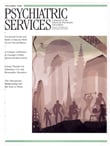Two group therapy models for clients with a dual diagnosis of substance abuse and personality disorder
Abstract
OBJECTIVE: The relative effectiveness of two types of group therapy-the disease-and-recovery model and the cognitive-behavioral model-was examined in a public inpatient and outpatient setting with consumers who had a dual diagnosis of a personality disorder and a substance use disorder. Outcomes in four areas of problem severity were measured: alcohol use, drug use, social and family relations, and psychological functioning. METHODS: Using a quasiexperimental group design, 19 subjects in an inpatient mental health facility and 19 in a public outpatient facility were randomly assigned to the two experimental groups. The groups met three times a week for 12 weeks, and specific group leadership protocols were used. A third group at each setting received usual group treatment. Diagnoses of all subjects were verified using the Structured Clinical Interview for DSM-III-R. The Addiction Severity Index measured changes in problem severity. RESULTS: In the inpatient setting, subjects in both experimental groups had significantly improved social and family relations compared with the usual-treatment group; no posttest changes in the other three areas were noted. In the outpatient setting, cognitive-behavioral group therapy was significantly more effective than the other two group approaches in reducing alcohol use, improving social and family relations, and enhancing psychological functioning. CONCLUSIONS: Results suggest that the severity of mental health consumers' substance abuse problems can be substantially decreased in several areas in an outpatient public setting. In an inpatient setting, the use of either group therapy model was more effective in reducing problem severity than using no specific model.
Access content
To read the fulltext, please use one of the options below to sign in or purchase access.- Personal login
- Institutional Login
- Sign in via OpenAthens
- Register for access
-
Please login/register if you wish to pair your device and check access availability.
Not a subscriber?
PsychiatryOnline subscription options offer access to the DSM-5 library, books, journals, CME, and patient resources. This all-in-one virtual library provides psychiatrists and mental health professionals with key resources for diagnosis, treatment, research, and professional development.
Need more help? PsychiatryOnline Customer Service may be reached by emailing [email protected] or by calling 800-368-5777 (in the U.S.) or 703-907-7322 (outside the U.S.).



